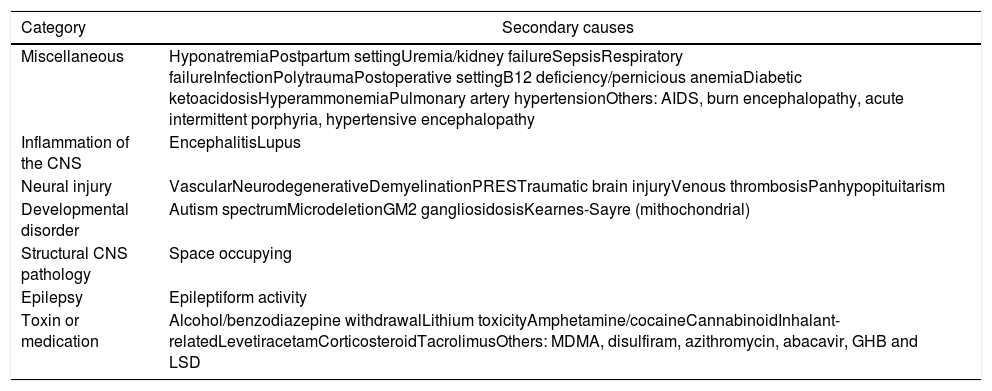Neurosyphilis has long been recognized as a disease with great mimicking power for multiple neuropsychiatric syndromes, whose prevalence and clinical manifestations have changed thanks to the introduction of antibiotics. It remains a treatable cause of cognitive decline with varying outcomes. Its early recognition and prompt treatment ameliorate the patient's functionality. Still, due to multiple difficulties in its diagnosis, its consideration may be absent from the clinical evaluation delaying the treatment and impacting the outcomes. From the myriad of neuropsychiatric symptoms associated with the presentation of this disease, catatonia holds a special place in the history of psychiatry. However, this presentation has fallen outside modern literature.
CaseA major neurocognitive disorder presented in a 45-year-old male patient without a previous medical history with multiple neuropsychiatric symptoms such as irritability, personality changes, apathy, and delusions misdiagnosed and treated as a depressive episode until a catatonic syndrome was established. This required expeditious hospitalization and medical workup to diagnose neurosyphilis as the underlying etiology. As an in-patient, the differentiation between behavioral symptoms residual to the neurodegenerative process, catatonia, and delirium was central to the patient's care.
ConclusionNeurosyphilis continues to be an important cause of neuropsychiatric syndromes, closely related to neurocognitive presentations. It requires early recognition and treatment to ameliorate the outcomes. Once the neurodegenerative process has taken hold, differentiating between behavioral symptoms due to neurodegeneration and diagnosing other neuropsychiatric syndromes such as delirium or catatonia may be a clinical challenge.
La neurosífilis ha sido reconocida como un gran camaleón en términos neuropsiquiátricos con la posibilidad de imitar múltiples síndromes neuropsiquiátricos, cuya prevalencia y manifestaciones clínicas han cambiado gracias a la introducción de los antibióticos. Perdura como una causa tratable de deterioro cognitivo con desenlaces variables. El reconocimiento temprano y su tratamiento mejora la funcionalidad del paciente. Sin embargo, debido a las múltiples dificultades en su diagnóstico, su consideración puede estar ausente de la evaluación clínica retrasando su tratamiento e impactando en sus desenlaces. De los múltiples síntomas neuropsiquiátricos asociados, la catatonia tiene un lugar especial en la historia de la psiquiatría, pero su estudio ha disminuido en la literatura moderna.
CasoUn trastorno neurocognitivo mayor presentado en un paciente de 45 años sin historia médica previa con múltiples síntomas neuropsiquiátricos como irritabilidad, cambios en su personalidad, apatía e ideas delirantes fueron diagnosticadas erróneamente como un episodio depresivo hasta que se estableció un síndrome catatónico. Durante el tratamiento intrahospitalario se realizó el diagnóstico de neurosífilis como causa subyacente. En este contexto, la diferenciación entre síntomas comportamentales residuales al proceso neurodegenerativo, la catatonia y el delirium fueron centrales en el cuidado del paciente.
ConclusiónLa neurosífilis continúa siendo una causa importante de síndromes neuropsiquiátricos con una relación cercana con presentaciones neurocognitivas. Requiere de una detección y un tratamiento tempranos para la mejoría de sus desenlaces. Una vez el proceso neurodegenerativo se instaura, la diferenciación entre síntomas conductuales debido a la neurodegeneración y el diagnóstico diferencial de otros síndromes neuropsiquiátricos como el delirium o la catatonia son un desafío clínico.








